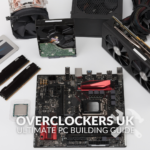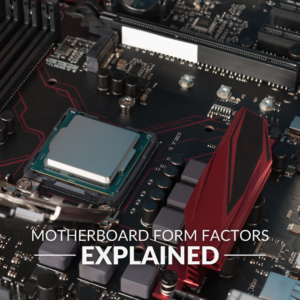When it comes to selecting the perfect components for your gaming PC, it can seem a little daunting. Especially when you have to also consider the size of your hardware, not just the type of hardware you need.
That’s where our team of PC experts at Overclockers UK comes in! We’ve put together this handy guide showing you everything you need to know about different graphics card form factors.

Graphics Card Form Factors
Graphics cards come in all shapes and sizes. Knowing which one will fit into your case is key when building your dream gaming PC.
GPU form factor depends on two things, length and width. The length of a GPU can be determined by how many fans it has, ranging from zero to three. Whereas, the width or thickness of a graphics card refers to the number of PCIe slots it will take up on the case and motherboard. The most common sizes are single, dual, or triple slot.
Most graphics cards are available in either a low or high profile form factor.
Low-Profile Graphics Cards:
Low profile GPUs are typically single slot and won’t have more than one fan. Most low profile graphics cards tend not to require a PCIe power connector and need very little power to run, due to the small heatsink.
Single Slot:
A single slot GPU only takes up one slot on the motherboard and case. These GPUs are perfect for those looking to create a standard office PC or home theatre system.

ASUS GeForce GT 1030 Graphics Card
- Low profile GPU
- Single-slot
- 2GB integrated VRAM
High-Profile Graphics Cards:
High profile graphics cards are often dual or triple slot. These cards are longer, will have two or more fans, and typically use more than one rear case expansion slot. On the majority of motherboards, high-profile GPUs will also cover the second PCIe slot due to the integrated heatsink.
Most high-profile cards require more power than a low profile. We would recommend at least 600W.
Dual Slot:
A dual slot GPU will take up two slots on the motherboard and case. These graphics cards are most likely to be longer and wider compared to single slot. They also tend to have between one to three fans.
This makes them perfect for high end gaming PCs of all sizes, including small form factor builds, such as Mini-ITX.

Gigabyte Radeon RX 7900XTX 24GB GDDR6 Graphics Card
- Dual slot
- AMD Radeon RX 7000 Series
- RDNA 3 architecture
- 24GB GDDR6
Triple Slot:
Triple slot graphics cards occupy three slots on the case and motherboard due to the large heatsinks. These graphics cards aren’t as easy to build with as they aren’t compatible with some smaller cases. Especially cases that only come with two slots. If you have a triple slot GPU, it’s crucial you ensure its compatible with your case.
These GPUs are ideal for bigger gaming systems that have ample space to house them.
MSI GeForce RTX 4090 Suprim x 24GB GDDR6X Graphics Card
- Triple slot
- RTX 40 Series
- 16384 CUDA cores
- 2640MHz boosted clock speed
- 24GB GDDR6X

Will the Size of my GPU Affect My Ability to Install it?
In short, yes!
The bigger the graphics card the harder it is to install inside your case. High-profile GPUs can require a number of expansion slots and cover more of the motherboard. This can make cable management, installing AiOs, or intricate water-cooling loops quite a challenge.
What Size Case Do I Need for My Graphics Card?
When selecting your case, you need to ensure that it has a GPU clearance that is larger than the length and width of your graphics card. Along with enough expansion slots.
The GPU clearance refers for how much space your case has for a GPU, without restricting any custom configurations. If the GPU is too long or wide, it can limit the available room for things such as AiOs, cable management, water cooling, PSU shrouds, and can even impact airflow. To find the GPU clearance, we recommend that you consult with the case manufacturer’s website to ensure full compatibility.
For a closer look at the best compatible PC cases for your chosen graphics, take a look at our dedicated blog posts.
PC Cases for the AMD Radeon RX 6000 Series

PC Cases for the NVIDIA RTX 30 Series

PC Cases for the AMD Radeon RX 7000 Series

PC Cases for the NVIDIA RTX 40 Series


Building your own gaming PC can be a daunting task. That’s why we’ve put together the Overclockers UK Ultimate PC Building Guide.
Read More in ‘Form Factors Explained’
PC Cases

PSU

Motherboard

